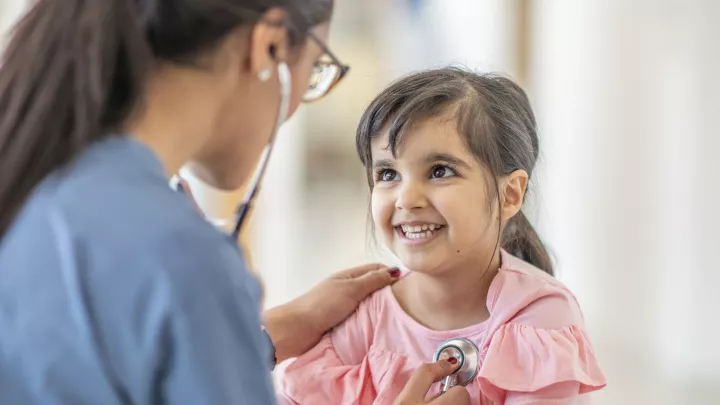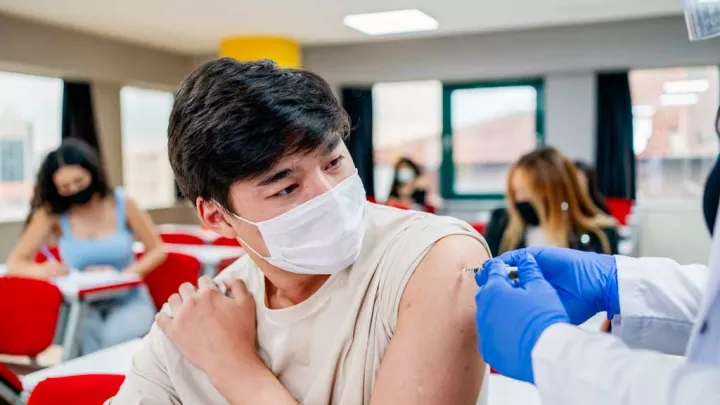Heart Transplant Program
Hearing your child may need a heart transplant can feel overwhelming. But our team is here to help you and your child throughout the process.
The Heart Transplant Program at Children's Hospital Los Angeles offers world-class care. Our pediatric heart surgeons have experience successfully operating on children with complex anatomy. You can rest assured knowing your child will get treatment from globally recognized experts.
Heart Transplant Program: Why Choose Us
U.S. News & World Report ranks CHLA among the best in the country for cardiology and heart surgery care. The same report lists CHLA as one of the top 10 children’s hospitals in the nation. This means your child has access to the best possible care before, during and after a heart transplant. Our Heart Transplant Program offers:
- Exceptional outcomes: Our three-year survival rate following a heart transplant is among the best in the country. View our heart transplant outcome data from the Scientific Registry of Transplant Recipients.
- World-renowned expertise: Vaughn Starnes, MD, an internationally recognized expert in pediatric cardiothoracic surgery and pediatric heart transplants, founded our Heart Transplant Program. Medical director JonDavid Menteer, MD, and surgical director Cynthia Herrington, MD, now lead the world-class care team. All our surgeons have experience performing transplants in children with complex and rare anatomy. Your child receives treatment from pioneering experts in pediatric heart transplants.
- Integration with our Heart Failure Team: Our team takes pride in providing the best treatment for each patient, regardless of whether that requires a heart transplant or not. The evaluation process for transplant includes consideration of all other options, including medical treatments, surgical treatments, and even experimental therapies.
- Personalized, child-focused care: Our team works to find the best treatment options for your child, from ventricular assist devices (VADs) to transplants and clinical trials. And as a dedicated pediatric hospital, our facility is set up with children’s comfort in mind. We also have Child Life specialists who support your child’s social and emotional needs.
- Human Leucocyte Antigen (HLA) Lab: HLA molecules help the body recognize its own cells. The body will attack cells with different HLA molecules, so it is critical to match them between a potential donor and recipient. Our HLA lab is an important part of our excellent outcomes. The HLA lab team comes to all transplant meetings and performs detailed testing to find the best match for your child.
- Transplant care coordinator: Many doctors, nurses and support specialists care for children receiving heart transplants. Our transplant care coordinator manages your child’s comprehensive treatment plan. The coordinator is also your family’s point of contact for any questions or concerns about your child’s care.
Pediatric Heart Transplant Research and Innovation
Our surgeons find creative solutions for treating children with multiple complex medical problems. Surgeons take part in leading-edge research and innovative treatments. Examples include:
- Transplant in children with complex heart defects, including a backward heart (read Ruben’s story)
- Patented new artificial right atrium to support children between a Fontan procedure and a transplant
- Clinical trial for stem cell therapy to treat or prevent heart failure in children with hypoplastic left heart syndrome
- Collaboration between the CHLA laboratory and the transplant team to seek new levels of understanding in human solid organ transplantation.
- Clinical trial testing whether heart failure drug Entresto works for children
- Heart-lung transplant on an infant, the youngest recipient at the time
Our Comprehensive Heart Transplant Care
The transplant team works closely with other subspecialty teams to provide comprehensive care. This care collaboration gives your child more treatment options and a better chance at a positive outcome. Heart transplant surgeons frequently coordinate with:
- Cardiomyopathy and Heart Failure Program: This program treats children with all types of cardiomyopathy (heart muscle disease) and other forms of heart failure, including heart failure after repair of congenital heart defect. Your child may be a candidate for medication to treat heart failure before, or instead of, a heart transplant. The close collaboration between our transplant program and this program sets us apart, allowing us to provide a higher quality of care. Discover how the Cardiomyopathy and Heart Failure Program can help your child.
- Single Ventricle Program: Children born with a single cardiac ventricle (lower chamber of the heart) may be eligible for reconstructive surgery through this program. Reconstructive surgery involves a series of operations that help your child’s heart function more effectively. Some children who receive these surgeries do not require transplants. For those who do, the surgeries can help improve quality of life and the chance for a successful transplant. Learn more about the Single Ventricle Program.
- Ventricular Assist Device (VAD) Program: VADs mechanically perform heart functions when a child’s heart is failing. These devices help stabilize critically ill children, and make them healthier candidates for transplants. A VAD may also help your child continue school and spend time with family and friends while waiting for a transplant. We have devices in sizes appropriate for infants, children and adult-sized teenagers. Explore the options our Ventricular Assist Device Program offers.
- Cardiothoracic Intensive Care Unit (CTICU): After receiving a heart transplant, your child recovers in the CTICU. This specialized unit offers advanced monitoring and nursing experience to treat and track your child’s progress after surgery. This is also where children with the most serious heart conditions receive care while awaiting heart transplants. Learn more about our pediatric cardiothoracic ICU.
- Interventional Catheterization Program: Children who receive a heart transplant get follow-up care and monitoring in the catheterization lab. Catheterization is way to look at your child’s heart and heart function without surgery. See how the Interventional Catheterization Program can monitor your child’s recovery from a heart transplant.
- Psychological Support: Children who need heart transplants often need help to understand and cope with their illness, vulnerability, and the stigmas of being “different.” Our team’s psychologist and social worker as well as our experienced team of child life workers and therapists help make the entire process of heart transplantation life easier to understand and endure. Learn more about our Cardiac Psychology Program.
Heart Conditions We Treat
We provide integrated care to children with conditions including:
- Arrhythmogenic right ventricular dysplasia
- Cardiomyopathy
- Complex congenital heart disease
- Congenital heart defects
- Congenitally corrected transposition of the great arteries
- Congestive heart failure
- Dilated cardiomyopathy
- Ebstein’s anomaly
- Failing Fontan physiology
- Graft failure after prior transplant
- Heart failure
- Heart transplant rejection
- Hypoplastic left heart syndrome
- Pulmonary hypertension
- Post-transplant lymphoproliferative disease
- Restrictive cardiomyopathy
- Tricuspid atresia
Does Your Child Need a Heart Transplant?
Learn more about the transplant process:
One thing that sets our program apart from others is its integration with other cardiac care programs at Children's Hospital Los Angeles. The end goal of our program is not a heart transplant. We strive to give your child the best possible outcome and quality of life, in the least invasive way possible. When your child comes to us for a heart transplant consult, we evaluate all treatment options to find the best fit.


